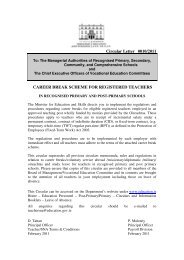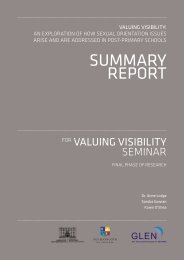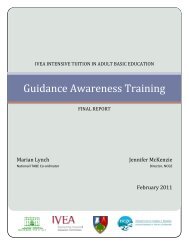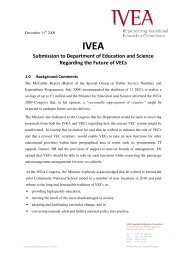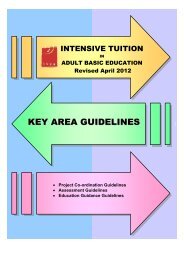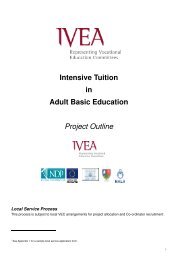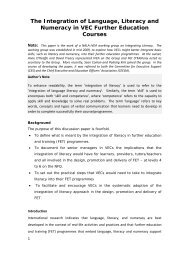Timeline: A look at Vocational Education from 1902 to the ... - IVEA
Timeline: A look at Vocational Education from 1902 to the ... - IVEA
Timeline: A look at Vocational Education from 1902 to the ... - IVEA
Create successful ePaper yourself
Turn your PDF publications into a flip-book with our unique Google optimized e-Paper software.
<strong>Timeline</strong>:<br />
A <strong>look</strong> <strong>at</strong><br />
Voc<strong>at</strong>ional<br />
Educ<strong>at</strong>ion<br />
<br />
<br />
TITLES OF NATIONAL ASSOCIATION<br />
1. <strong>1902</strong> – 192 Irish Technical Instruction Associ<strong>at</strong>ion (ITIA)<br />
2. 1929 – 1944 Irish Technical Educ<strong>at</strong>ion Associ<strong>at</strong>ion (ITEA)<br />
3. 1944 – 2013 Irish Voc<strong>at</strong>ional Educ<strong>at</strong>ion Associ<strong>at</strong>ion (<strong>IVEA</strong>)<br />
4. 2013 Educ<strong>at</strong>ion and Training Boards Ireland (ETBI)<br />
COMPOSITION OF ASSOCIATION<br />
In 1914<br />
There were 72 Instruction Committees in all Ireland<br />
In 1930<br />
Last Congress before 1930 Voc<strong>at</strong>ional Educ<strong>at</strong>ion Act <strong>the</strong>re were 48 Technical Educ<strong>at</strong>ion Committees in<br />
Saorst<strong>at</strong> Eireann.<br />
From Nor<strong>the</strong>rn Ireland 10 Technical Educ<strong>at</strong>ion Committees <strong>at</strong>tended <strong>the</strong> 1930 Congress in Cork.<br />
In 1931<br />
Following <strong>the</strong> restructuring of <strong>the</strong> sec<strong>to</strong>r with <strong>the</strong> enactments of <strong>the</strong> 1930 Voc<strong>at</strong>ional Educ<strong>at</strong>ion Act, <strong>the</strong>re were<br />
38 Voc<strong>at</strong>ional Educ<strong>at</strong>ion Committees (VECs) as follows:<br />
a. 27 Counties (including Tipperary North Riding and Tipperary South Riding).<br />
b. 4 City Boroughs, Dublin, Cork, Limerick and W<strong>at</strong>erford.<br />
c. 7 Town VECs - Bray, Drogheda, Dun Laoghaire, Galway, Sligo, Tralee and Wexford.<br />
In 1931<br />
From Nor<strong>the</strong>rn Ireland – 10 Technical Instruction Committees <strong>at</strong>tended Congress, (Enniskillen) as follows:<br />
1. Belfast, Co. Borough Educ<strong>at</strong>ional Committee (Technical Sub-Committee)<br />
2. North Antrim Regional Educ<strong>at</strong>ion Committee (Technical Sub-Committee<br />
3. Ballymena Regional Educ<strong>at</strong>ion Committee (Technical Sub-Committee)<br />
4. County Down Regional Educ<strong>at</strong>ion Committee (Technical Sub-Committee)<br />
5. Larne Regional Educ<strong>at</strong>ion Committee (Technical Sub Committee)<br />
6. Larne Urban District Technical Instruction Committee<br />
7. Armagh Urban District Technical Instruction Committee)<br />
8. County Fermanagh Regional Educ<strong>at</strong>ion Committee (Technical Sub-Committee)<br />
9. Lisburn and Belfast Regional Educ<strong>at</strong>ion Committee (Technical Sub-Committee)<br />
°°
Municipal technical schools<br />
in Ireland d<strong>at</strong>e <strong>from</strong> 1887<br />
with <strong>the</strong> opening in Dublin<br />
of Kevin Street Technical Schools <strong>to</strong><br />
<strong>the</strong> present 2013 i.e. 126 years, but<br />
<strong>the</strong>re was a long pre-his<strong>to</strong>ry going back<br />
<strong>to</strong> <strong>the</strong> medieval trade guilds where<br />
<strong>the</strong> apprenticeship system was firmly<br />
established and developed, as in <strong>the</strong><br />
rest of Europe.<br />
It is proposed here <strong>to</strong> follow <strong>the</strong> s<strong>to</strong>ry<br />
of Technical and Voc<strong>at</strong>ional Educ<strong>at</strong>ion<br />
in Ireland through a timeline, which will<br />
be illustr<strong>at</strong>ed with some of <strong>the</strong> people<br />
and places connected with <strong>the</strong> course<br />
of this his<strong>to</strong>ry of a very important<br />
educ<strong>at</strong>ional endeavour.<br />
John Marcus O’Sullivan, Minister for<br />
Educ<strong>at</strong>ion 1926-1932. He steered <strong>the</strong><br />
Voc<strong>at</strong>ional Educ<strong>at</strong>ion Act, 1930 through<br />
<strong>the</strong> Dail leading <strong>to</strong> <strong>the</strong> establishment<br />
of Voc<strong>at</strong>ional and Technical schools<br />
throughout <strong>the</strong> country.<br />
John Ingram, Chairman of <strong>the</strong> Technical<br />
Educ<strong>at</strong>ion Commission. He was <strong>the</strong><br />
mastermind in framing <strong>the</strong> Voc<strong>at</strong>ional<br />
Educ<strong>at</strong>ion Act, 1930.<br />
Jack McCann long-time President<br />
of <strong>IVEA</strong> 1972-1984.<br />
Tom Keenan, President <strong>IVEA</strong><br />
1984-1985<br />
Seán Conway, President <strong>IVEA</strong><br />
1986-1995<br />
Joseph K. Rooney <strong>the</strong> first full time<br />
General Secretary <strong>IVEA</strong> 1980-1996<br />
Brendan Griffin, President <strong>IVEA</strong><br />
1996-2004<br />
Mary Bohan, President <strong>IVEA</strong> 2004-2010<br />
° °
TIMELINE<br />
1192<br />
Prince John (as Lord of Ireland, l<strong>at</strong>er King John) decreed th<strong>at</strong> <strong>the</strong> citizens of Dublin were granted “<strong>the</strong> right of<br />
having all <strong>the</strong>ir reasonable guilds as <strong>the</strong> burgesses of Bris<strong>to</strong>l have” – Dublin was twinned with Bris<strong>to</strong>l in its<br />
Norman settlement period.<br />
1824<br />
Dublin Mechanics’ Institute, Lower Abbey Street (now <strong>the</strong> Abbey The<strong>at</strong>re) founded one year after <strong>the</strong> London<br />
Mechanics’ Institute (1823). Afterwards <strong>the</strong>re were 28 Mechanics’ Institutes in Ireland, including <strong>the</strong> Bianconi<br />
sponsored one in Clonmel.<br />
1853<br />
The Science and Art Department, South Kensing<strong>to</strong>n, London was founded, following <strong>the</strong> Gre<strong>at</strong> Intern<strong>at</strong>ional<br />
Industrial Exhibition in 1851 in Hyde Park, London. There was a similar Exhibition in Dublin in 1853. Science<br />
and art classes were organised in Ireland, mainly by n<strong>at</strong>ional school teachers after school hours, for payment<br />
by results.<br />
1865 The Dublin Intern<strong>at</strong>ional Exhibition, held in Earlsfort Terrace, Dublin, now The N<strong>at</strong>ional Concert Hall.<br />
1867<br />
The Royal College of Science, Ireland (1845), 51, St. Stephen’s Green, Dublin reconstituted. Science and<br />
engineering subjects were taught leading <strong>to</strong> an Associ<strong>at</strong>e (A.R.C.Sc.I) or Fellowship (F.R.C.Sc.I) qualific<strong>at</strong>ion.<br />
1880<br />
City and Guilds of London Institute founded. It became <strong>the</strong> leading technical certific<strong>at</strong>ion body in technical<br />
educ<strong>at</strong>ion.<br />
1881 -<br />
1884<br />
Commission on Technical Instruction for Gre<strong>at</strong> Britain and Ireland showed <strong>the</strong> need for municipal technical<br />
schools similar <strong>to</strong> those in Germany and <strong>the</strong> United St<strong>at</strong>es of America.<br />
1885<br />
Irish Artisans’ Exhibition, held in Exchequer Street, Dublin brought <strong>the</strong> trades’ unions <strong>to</strong>ge<strong>the</strong>r in a<br />
concentr<strong>at</strong>ed effort <strong>to</strong> establish a technical school.<br />
1887<br />
Kevin Street Technical Schools opened. Two schools, one for science and art subjects and one for technical<br />
trade subjects were run in <strong>the</strong> building.<br />
1889<br />
First Technical Instruction Act for Gre<strong>at</strong> Britain and Ireland. Allowed one penny <strong>to</strong> be struck on r<strong>at</strong>es <strong>to</strong> support<br />
a school. 14 Irish schools were aided under this act.<br />
1895 -<br />
1896<br />
Recess Committee seeks Irish Department. “Constructive Unionism” seeks <strong>to</strong> mollify Ireland.<br />
°°
1898 Local Government Ireland Act introduces new city borough, <strong>to</strong>wn and county councils.<br />
1899 Department of Agriculture and Technical Instruction (DATI) Act.<br />
1990 DATI commences April 1900.<br />
<strong>1902</strong><br />
1903 -<br />
1904<br />
° Every local authority in Ireland had agreed <strong>to</strong> raise a r<strong>at</strong>e for Technical Instruction.<br />
° The Irish Technical Instruction Associ<strong>at</strong>ion (ITIA) was founded by deleg<strong>at</strong>es <strong>from</strong> Technical Instruction<br />
Committees meeting <strong>at</strong> <strong>the</strong> Cork Intern<strong>at</strong>ional Exhibition, <strong>at</strong> <strong>the</strong> invit<strong>at</strong>ion of Fr. P. J. Dowling C.M.<br />
The second Annual Congress of <strong>the</strong> ITIA was held in Belfast and in 1904 in Dublin.<br />
The Department of Agriculture and Technical Instruction (DATI) recognises <strong>the</strong> ITIA as <strong>the</strong> official represent<strong>at</strong>ive<br />
body <strong>to</strong> which <strong>the</strong> Department of Technical Instruction Committee funds could be alloc<strong>at</strong>ed.<br />
1905<br />
The Congress in Limerick was <strong>at</strong>tended by deleg<strong>at</strong>es <strong>from</strong> <strong>the</strong> 6 city boroughs, 26 urban districts and 24<br />
counties i.e. 56 Technical Instruction Committees.<br />
1911<br />
On <strong>the</strong> 10th anniversary, <strong>the</strong> Congress was held in Manchester as a tre<strong>at</strong> but much work was done <strong>at</strong> Congress<br />
and many civic and industrial concerns were visited<br />
1914<br />
Congress was held in Killarney with represent<strong>at</strong>ions of 72 Committees in <strong>at</strong>tendance. Deleg<strong>at</strong>es were<br />
completely unaware of <strong>the</strong> impending outbreak of war in August.<br />
1915 -<br />
1918<br />
No Congress held due <strong>to</strong> <strong>the</strong> Gre<strong>at</strong> War, The Easter Rebellion and <strong>the</strong> War of Independence.<br />
1922<br />
58 TICs sent deleg<strong>at</strong>es <strong>to</strong> Congress of which 9 were <strong>from</strong> Nor<strong>the</strong>rn Ireland, including Belfast and Derry. T. P.<br />
Gill and Fr. Tom Finlay SJ sought hard <strong>to</strong> encourage <strong>the</strong> Nor<strong>the</strong>rn Committees <strong>to</strong> stay on board and gradually<br />
some more returned <strong>to</strong> Congress until <strong>the</strong> disastrous Congress of 1933.<br />
1924 New Department of Educ<strong>at</strong>ion takes over Technical Instruction Board (TIB).<br />
° °
1926<br />
The title of <strong>the</strong> Associ<strong>at</strong>ion was changed <strong>to</strong> Irish Technical Educ<strong>at</strong>ion Associ<strong>at</strong>ion (ITEA) in view of <strong>the</strong><br />
imminence of The Voc<strong>at</strong>ional Educ<strong>at</strong>ion Act.<br />
Voc<strong>at</strong>ional Educ<strong>at</strong>ion Act establishing 38 Voc<strong>at</strong>ional Educ<strong>at</strong>ion Committees, 27 Counties (including Tipperary<br />
North Riding and Tipperary South Riding) and 4 City Boroughs and 7 Town VECs.<br />
1930<br />
1931<br />
The 1930 Act provided for two types of school – <strong>the</strong> prepar<strong>at</strong>ory trade/ commercial/home economics school<br />
of “Continu<strong>at</strong>ion” i.e. beyond primary educ<strong>at</strong>ion for those leaving primary school <strong>at</strong> 14 years until 16 years.<br />
And “technical educ<strong>at</strong>ion” typically began <strong>at</strong> 17 years of age or older, which would, often in an apprenticeship<br />
framework, engage in technical studies proper. From <strong>the</strong> found<strong>at</strong>ion of <strong>the</strong> DATI, it was <strong>the</strong> absence of a<br />
prepar<strong>at</strong>ory educ<strong>at</strong>ion between 14 years and 16 years (in places filled by <strong>the</strong> 16 Day Trade Prepar<strong>at</strong>ory<br />
Schools), which prevented progress <strong>at</strong> <strong>the</strong> start of <strong>the</strong> technical educ<strong>at</strong>ion proper.<br />
Apprenticeship Act – The 1926 – 1927 Commission on Technical Educ<strong>at</strong>ion initially wanted <strong>the</strong> apprenticeship<br />
system <strong>to</strong> be put under <strong>the</strong> VECs but <strong>the</strong> Trade Unions, who determined entry <strong>to</strong> trades, under agreements with<br />
<strong>the</strong> employers, would not let go of this system. It was little over 20 years since <strong>the</strong> 1913 Look Out and class<br />
warfare was still very much in <strong>the</strong> air. It was not until 1959 th<strong>at</strong> <strong>the</strong> Minister for Industry and Commerce, Sean<br />
Lemass T.D, revisited <strong>the</strong> issue of apprenticeship training with <strong>the</strong> establishment of AnCo.<br />
1931<br />
Congress held in Enniskillen. Deleg<strong>at</strong>es were welcomed by Sir Basil Brooke, who, <strong>at</strong> this time (contrary<br />
<strong>to</strong> common belief) was pro all-Ireland co-oper<strong>at</strong>ion. L<strong>at</strong>er, <strong>at</strong> <strong>the</strong> Congress Seminar, he said th<strong>at</strong> while Co.<br />
Fermanagh had many lakes, Sou<strong>the</strong>rn deleg<strong>at</strong>es would not be forced <strong>to</strong> drink w<strong>at</strong>er only.<br />
1933<br />
Congress held in Belfast. Deleg<strong>at</strong>es welcomed by Lord Charlemont, Minister for Educ<strong>at</strong>ion, The Lord Mayor<br />
of Belfast etc. Coleraine Technical Instruction Committee re-joined <strong>the</strong> Associ<strong>at</strong>ion. Councillor W MacCartney<br />
suggested <strong>the</strong>y could all try <strong>to</strong> learn <strong>the</strong> Irish language. But a caucus of sou<strong>the</strong>rn deleg<strong>at</strong>es elected a C<strong>at</strong>holic<br />
priest as President of <strong>the</strong> Associ<strong>at</strong>ion (who would preside over <strong>the</strong> mainly Presbyterian Nor<strong>the</strong>rn Committees).<br />
The mood of Nor<strong>the</strong>rn deleg<strong>at</strong>es suddenly changed and <strong>the</strong> Minister for Educ<strong>at</strong>ion ended all fur<strong>the</strong>r particip<strong>at</strong>ion<br />
of Nor<strong>the</strong>rn Committees. Congress ended in Nor<strong>the</strong>rn Ireland with very hostile exchanges between Nor<strong>the</strong>rn and<br />
some Sou<strong>the</strong>rn deleg<strong>at</strong>es. It was not until 1965 in <strong>the</strong> lead up <strong>to</strong> <strong>the</strong> O’Neill-Lemass talks th<strong>at</strong> Mr/ Tom Cowen of<br />
<strong>the</strong> Nor<strong>the</strong>rn Ministry of Educ<strong>at</strong>ion addressed deleg<strong>at</strong>es <strong>at</strong> <strong>the</strong> <strong>IVEA</strong> Congress in Sligo.<br />
1936 Congress welcomed <strong>the</strong> new Department of Educ<strong>at</strong>ion trade examin<strong>at</strong>ions.<br />
1938<br />
Following <strong>the</strong> r<strong>at</strong>ific<strong>at</strong>ion of <strong>the</strong> 1937 Constitution, which established Seanad Eireann on <strong>the</strong> lines of voc<strong>at</strong>ional<br />
panels, with <strong>the</strong> ITEA having <strong>the</strong> right <strong>to</strong> nomin<strong>at</strong>e members for election <strong>to</strong> <strong>the</strong> Educ<strong>at</strong>ional Panel in <strong>the</strong> first<br />
election <strong>to</strong> <strong>the</strong> Seanad in 1938 Seamus Úas O’hEochadha (An Fear Mor), Principal of Ring College, W<strong>at</strong>erford<br />
and Co. W<strong>at</strong>erford VEC (l<strong>at</strong>er a President of <strong>IVEA</strong>) was elected. He was <strong>the</strong> first of a long list of <strong>IVEA</strong> members<br />
<strong>to</strong> be elected <strong>to</strong> Seanad Eireann up <strong>to</strong> <strong>the</strong> present.<br />
1942<br />
Congress members had prepared for <strong>the</strong> Department of Educ<strong>at</strong>ion Memorandum V40, which set out Group sets<br />
of subjects <strong>to</strong> be followed by boys or girls in <strong>the</strong> Voc<strong>at</strong>ional Schools, and it emphasised <strong>the</strong> Christian ethos and<br />
religious syllabus, which was <strong>to</strong> be followed in schools.<br />
1944<br />
The Associ<strong>at</strong>ion’s title was changed <strong>to</strong> “Irish Voc<strong>at</strong>ional Educ<strong>at</strong>ion Associ<strong>at</strong>ion” reflecting <strong>the</strong> majority part<br />
of Voc<strong>at</strong>ional Educ<strong>at</strong>ion being pursued and, perhaps, <strong>the</strong> widespread discussion on Voc<strong>at</strong>ional viz-a-viz The<br />
Commission of Voc<strong>at</strong>ional Organis<strong>at</strong>ion th<strong>at</strong> year.<br />
°°
1947<br />
The Group Certific<strong>at</strong>e examin<strong>at</strong>ion was introduced as even players wanted <strong>to</strong> have some standard of formal<br />
educ<strong>at</strong>ion indic<strong>at</strong>ed, and Voc<strong>at</strong>ional School students were ineligible <strong>to</strong> take Civil Service type examin<strong>at</strong>ions for<br />
<strong>the</strong> Post Office Clerkships etc.<br />
1948<br />
1956<br />
Following proposals <strong>to</strong> place Voc<strong>at</strong>ional Schools under <strong>the</strong> control of N<strong>at</strong>ional School educ<strong>at</strong>ion or a religious<br />
congreg<strong>at</strong>ion, Minister for Educ<strong>at</strong>ion, General Richard Mulcahy, a gradu<strong>at</strong>e in telephonic install<strong>at</strong>ion <strong>from</strong> Bol<strong>to</strong>n<br />
Street College of Technology, and his successor Sean Moylan, a trained carpenter and house builder, equally<br />
held <strong>the</strong> line <strong>to</strong> retain <strong>the</strong> local authority run VEC system.<br />
Under <strong>the</strong> post-war Marshall Aid Plan for Ireland, Martin Gleeson, CEO of <strong>the</strong> City of Dublin VEC went <strong>to</strong> America<br />
<strong>to</strong> see <strong>the</strong> oper<strong>at</strong>ion of <strong>the</strong> new Technician c<strong>at</strong>egory of employee and this subject became a regular <strong>to</strong>pic of<br />
discussion <strong>at</strong> Congress as technicians were gradually introduced <strong>to</strong> all levels of Irish industry, research and<br />
educ<strong>at</strong>ion.<br />
1958 Dr. Ken. Whittaker’s seminal “Economic Development” plan praises <strong>the</strong> Voc<strong>at</strong>ion and Technical School System.<br />
1963<br />
The Intern<strong>at</strong>ional Apprentice Competitions, held <strong>at</strong> Bol<strong>to</strong>n Street College, Dublin, with many Irish successes,<br />
as usual.<br />
1966<br />
“Investment in Educ<strong>at</strong>ion” report proposes development of voc<strong>at</strong>ional and technical educ<strong>at</strong>ion. Martin Gleeson,<br />
CEO, City of Dublin VEC proposes permanent Secretari<strong>at</strong> for <strong>IVEA</strong>. Mr. Gleeson was a founder member of <strong>the</strong><br />
Irish Management Institute.<br />
1968 Report on Technological Educ<strong>at</strong>ion proposes Regional Technical Colleges under VECs. Report adopted forthwith.<br />
1970<br />
The Voc<strong>at</strong>ional Educ<strong>at</strong>ion (Amendment) Act, 1970, provided for VECs <strong>to</strong> become partners in Community<br />
Schools and <strong>the</strong> Department of Educ<strong>at</strong>ion pushed amalgam<strong>at</strong>ions of Secondary and Voc<strong>at</strong>ional Schools in<strong>to</strong><br />
new Community Schools.<br />
1980<br />
The Associ<strong>at</strong>ion set up a permanent Secretari<strong>at</strong> with Joseph Rooney as General Secretary<br />
The Community College model was accepted by <strong>the</strong> religious authorities, The Department of Educ<strong>at</strong>ion<br />
and <strong>IVEA</strong>.<br />
1985 <strong>IVEA</strong> opposes Regional Structures in favour of <strong>the</strong> county system.<br />
1987 Thre<strong>at</strong> of abolition of VECs. Amalgam<strong>at</strong>ion of VECs proposed in r<strong>at</strong>ionalis<strong>at</strong>ion plan.<br />
° °
1992 Separ<strong>at</strong>ion of RTCs in<strong>to</strong> stand-alone Institutes of Technology.<br />
1993 DIT becomes independent with degree awarding powers.<br />
1996<br />
Congress held in Newcastle, Co. Down.<br />
Joseph Rooney, General Secretary, dies suddenly, in office.<br />
1997<br />
Michael Moriarty confirmed as new General Secretary.<br />
Five Town VECs amalgam<strong>at</strong>ed with <strong>the</strong>ir respective counties i.e. Bray, Drogheda, Sligo, Tralee, and Wexford.<br />
This reduced <strong>the</strong> number of VECs <strong>to</strong> 33, with Dun Laoghaire and Galway City remaining Town VECs.<br />
1998 Educ<strong>at</strong>ion Act 1998<br />
2001 Voc<strong>at</strong>ional Educ<strong>at</strong>ion (Amendment) Act established, inter alia, <strong>the</strong> reserve/executive model of governance.<br />
2013<br />
The Educ<strong>at</strong>ion and Training Boards Act abolishes VECs, establishes Educ<strong>at</strong>ion and Training Boards (ETB) and<br />
recognises ETBI – Educ<strong>at</strong>ion and Training Boards Ireland as <strong>the</strong> successor body <strong>to</strong> <strong>IVEA</strong>. This followed on <strong>from</strong><br />
an Extraordinary Congress of <strong>the</strong> <strong>IVEA</strong> held on 8 February 2013 <strong>to</strong> approve <strong>the</strong> name change <strong>from</strong> <strong>IVEA</strong> <strong>to</strong> ETBI<br />
with effect <strong>from</strong> establishment d<strong>at</strong>e of <strong>the</strong> new ETBs.<br />
°°




